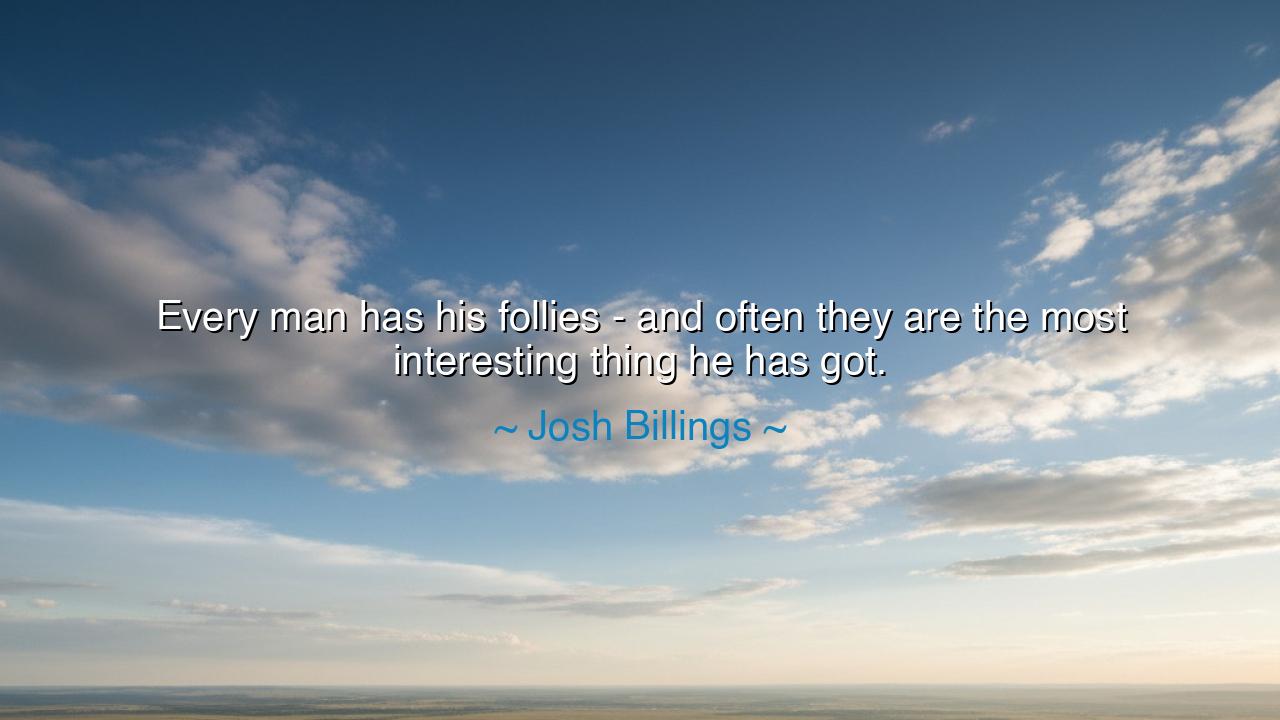
Every man has his follies - and often they are the most






In the grand theater of life, where each soul plays its part, there is an undeniable truth echoed through the words of Josh Billings: “Every man has his follies—and often they are the most interesting thing he has got.” In these simple yet profound words, Billings brings to light a truth about human nature that has been evident throughout history—the imperfection of humanity is not only a fact, but often the most compelling part of who we are. It is in our failures, our mistakes, and our eccentricities that we often find the deepest connections with others, and the richest insights into ourselves.
In the ancient world, the concept of follies was never seen as something to be ignored or hidden away. The great Greek philosophers, from Socrates to Aristotle, often spoke of the imperfections inherent in human nature. Socrates famously said, “The unexamined life is not worth living.” He understood that to live fully was to confront our flaws, to wrestle with our weaknesses, and to find meaning not in our perfect actions, but in our willingness to acknowledge and learn from them. The Greek tragedians, such as Sophocles and Euripides, understood this deeply, often portraying heroes whose follies—their pride, their hubris, their misjudgments—were central to their stories. These flaws were not just character defects; they were the essence of the human condition.
The story of King Oedipus, from Sophocles’ Oedipus Rex, is one such tale where the king’s tragic follies—his stubbornness, his belief in his own wisdom, and his failure to understand the prophecies—lead him to a fate that could not be avoided. Oedipus, like many ancient heroes, was defined not by his strength or intellect, but by his ability to confront his mistakes. The tragedy lay not just in the consequences of his follies, but in the fact that he was unable to escape them. And yet, his story is one of the most compelling in literature—a reflection of how imperfection is not just what makes us fall, but what makes us human, and, in the end, what makes us interesting.
This idea that follies shape our character is echoed in the lives of many who, though they faced failure or acted in foolish ways, became icons because of it. Consider the great Leonardo da Vinci, a man whose genius is often celebrated for his art, inventions, and discoveries. Yet, da Vinci’s life was also filled with mistakes—unfinished projects, missteps in his personal relationships, and frustrations with his own work. Yet, it is these very imperfections that give his life color and depth. His follies, like those of Oedipus, do not diminish his legacy—they enhance it. His struggles are what make his achievements all the more human and relatable, providing us with a glimpse into the mind of a man who was as flawed as he was brilliant.
In this way, Billings' insight serves as a reminder that it is often our imperfections that connect us to others. The perfect man is often the least interesting, the least relatable. It is in our follies that we find the courage to become better, to change, and to leave behind a legacy that others can see themselves in. To live a life free of mistakes is not to live a life fully, but to live a life devoid of the very experiences that give it meaning. Follies are the cracks through which the light of growth and understanding shines.
The lesson here is not to dwell in our follies as failures, but to embrace them as stepping stones toward greater wisdom. We are human, and it is through our mistakes that we learn, grow, and evolve. Rather than hiding our imperfections or seeking to be perfect, we must learn to celebrate them, knowing that they are not only defining moments but essential to our journey. Just as the ancient poets and philosophers did not hide the flaws of their heroes, we must also be willing to share and learn from our own.
The practical action we can take is to stop seeing our mistakes as things to hide or be ashamed of, but as the very essence of our growth. Instead of striving for perfection, we should focus on learning from our follies and growing from them. Whether in our personal lives, our work, or our relationships, let us own our mistakes, for it is in those very moments that we find the path forward. Like the great heroes and thinkers of the ancient world, it is our willingness to confront and learn from our follies that shapes us into the most interesting, powerful versions of ourselves.
Thus, let us embrace our follies as we embrace our humanity—knowing that in those imperfections lies the deepest, most profound truths about what it means to live, to fail, and to rise again. Through our mistakes, we become not less, but more, for it is through them that we discover our true potential. And in that discovery, we leave behind something far more enduring than perfection—a legacy of growth, wisdom, and humanity.






AAdministratorAdministrator
Welcome, honored guests. Please leave a comment, we will respond soon